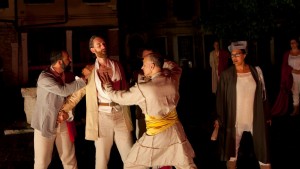VENICE AND THE GHETTO The perfect Play for Our Time
We live at a moment in which our dreams of a common humanity may well seem naïve and sentimental as we watch the repetitive intolerance of our present history. And yet we also live at a time in which, as those degrading repetitions testify, it has never seemed as urgent to keep those dreams alive.
This year is the 500th anniversary of the formation of the Venetian Ghetto and the 400th of Shakespeare’s death. Compagnia de’ Colombari’s production of Shakespeare’s Merchant of Venice, performed inside the walls of the Ghetto in the summer of 2016, brilliantly brings those anniversaries together. Their production finds in the play the voice of both the dream and the difficulty of achieving it. The play is arguably, though unnervingly, the perfect play for our time, speaking to the differences that we think divide us and to the shared hopes and anxieties that show us how little those differences should really mean.
It is not a comforting play. It tells us truths about ourselves that we may not wish to hear: we are often alike in ways that are unflattering, and different in ways that we should not take pride in. It tells us that it is often easier to hate than to love, but also that love is always complicated and often compromised. But the play, both as it is written and as it is performed, is the sign of the conviction that art can be a place where truth and love can be salvaged from the vulgarity and brutality of our history—and perhaps a means by which that history can be salvaged from itself.
*David Scott Kastan is a professor at Yale University. This article was published in the booklet by Ca’ Foscari University of Venice, Compagnia de’ Colombari and Committee for the 500 years of the Ghetto on the occasion of the new production of “The Merchant of Venice” performed for the first time in the Ghetto. The picture is by Andrea Messana.

